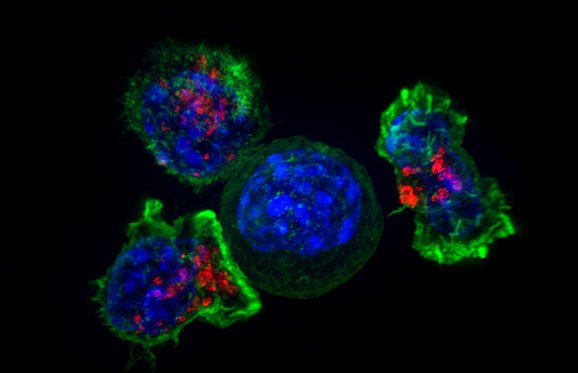
The findings, by researchers funded by Cancer Research UK and the Rosetrees Trust, could guide future immunotherapies and improve the way existing immunotherapy drugs are used.
As a tumour develops, the diversity of its genetic faults can be flagged on the cancer cell surface, as unique mutations appear in different parts of the tumour.
Crucially, by analysing data from hundreds of patients from previous studies, researchers found that some of these flags — known as antigens — represent the very earliest mutations of the disease and are displayed on all cells in the tumour, rather than a subset of tumour cells.
Then in the lab, they isolated specialised immune cells, called
Although they have the potential to wipe out all cancerous cells within the tumour, these potent immune cells are switched off by the tumour’s defences.
This research, published in Science, paves the way for therapies that specifically activate these T cells to target all the tumour cells at once based on the disease’s genetic signature. In the future, scientists could exploit this by developing a therapeutic vaccine to activate
Dr Sergio Quezada,
«Our research shows that instead of aimlessly chasing crimes in different neighbourhoods, we can give the police the information they need to get to the kingpin at the root of all organised crime — or the weak spot in a patient’s tumour — to wipe out the problem for good.»
The genetic complexity of cancer, which is flagged by tumour antigens, arises when cancers evolve in a branched manner. The earliest faults are found in all cells, forming the ‘trunk’ of the disease, while later mutations arise in some cells but not all. It is these ‘branches’ that allow the disease to adapt and become drug resistant.
Professor Charles Swanton,
«This opens up a way to look at individual patients’ tumours and profile all the antigen variations to figure out the best ways for immunotherapy treatments to work, prioritising antigens present in every tumour cell and identifying the body’s immune T cells that recognise them. This is really fascinating, and takes personalised medicine to its absolute limit where each patient would have a unique, bespoke treatment.»
Dr Quezada added: «For many years we have studied how the immune response to cancer is regulated without a clear understanding of what it is that immune cells recognise on cancerous cells. Based on these new findings, we will be able to tell the immune system how to specifically recognise and attack tumours.»
Professor Peter Johnson, Cancer Research UK’s chief clinician, said: «This fascinating research gives us vital clues about how to specifically tailor treatment for a patient using their immune system.
«It gets us closer to knowing why some patients respond to immunotherapy treatment and others don’t, and how we might select which patients will benefit the most.
«As well as suggesting a new way to treat cancer, the research fills key gaps in our knowledge about the effects of the immune system on tumours. This gives us hope of developing better treatments for some of the cancers we have previously found hardest to treat.»
Sam Howard, Chief Executive of Rosetrees Trust, said: «Rosetrees Trust is delighted to be able to support such cutting edge research carried out by outstanding researchers, which potentially has a direct human impact.»
Source: https://www.ucl.ac.uk/news/news-articles/0216/040316-tumours-seed-destruction/

